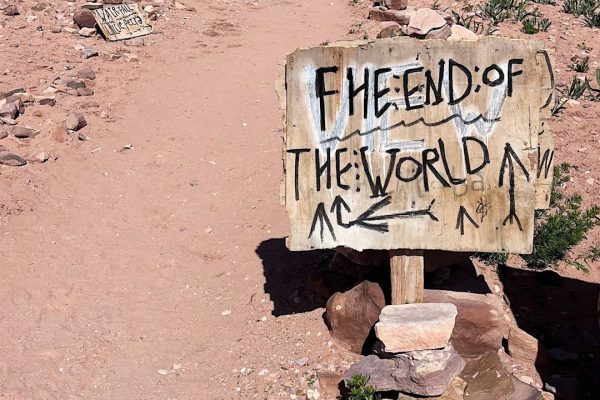This sermon, “He Cannot Save Himself,” was preached on Good Friday, April 14, 2017 by Matt Bedzyk
And those who passed by derided him, wagging their heads and saying, ‘Aha! You who would destroy the temple and rebuild it in three days, save yourself, and come down from the cross!’ So also the chief priests with the scribes mocked him to one another, saying, ‘He saved others; he cannot save himself. Let the Christ, the King of Israel, come down now from the cross that we may see and believe.’ Those who were crucified with him also reviled him. (Mark 15:29-32)
Jesus has been arrested, put on trial, brought before Pilate, Herod, then Pilate again. He has been beaten, spit upon, mocked, whipped, crowned with thorns, and now is nailed to a cross to die.
The story is a familiar one to most of us, and to most of the world at large. However, tonight I want to look at one particular event that took place during the crucifixion of Jesus. Here, we are given a clear picture of what the world demands of Jesus, the terrible cost of their demands, and ultimately a better understanding of the faithful work of Christ.
The Demands of this World
In this passage we have three groups of people reacting to the crucifixion of Christ: those passing by deride him; the religious elite mock him; and the two criminals insult him.
First, those who were passing by and saw Jesus hanging on the cross used the opportunity to ridicule and blaspheme him. “If you’re so powerful that you’d be able to destroy the entire temple and rebuild it in three days, prove it to us now by coming down from the cross!”
John’s gospel tells us that Jesus, having been asked for a sign, said: “Destroy this temple and in three days I will raise it up,” speaking of his death and resurrection, the temple of his body (Jn. 2:18-22). But here, as well as at his trial, his words were being twisted. The crowds had come to believe that Jesus was going to destroy their temple, which fueled their hatred of him. So, in hardened unbelief and hatred towards Jesus, they mock him and call for him to come down in order that he may get to work destroying their temple. “Save yourself, if you can!” (cf. Ps 22:7-8)
Second, the religious elite, the teachers of the law, those of all people who should have been first to recognize the Messiah and champion Jesus’ life and ministry, here mock him amongst themselves: “He saved others, but look—he can’t even save himself!”
Notice how they even admit here that Jesus did perform miracles, heal, and save many. They witnessed his ministry for three years yet still rejected him and his claims. Adding to the ridicule of the crowds passing by, they mock him further: “Let the Christ, the King of Israel, come down that we may see and believe. You claimed to be the Christ, so now just prove it by saving yourself; come down from the cross, and we will see and believe!” Fully convinced that Jesus was simply a Messianic pretender, a false prophet, a failed revolutionary, they mock his inability to save himself. They know he’s done for, that he’s doomed to die a slow, painful death, so they ridicule and mock him with sarcasm.
And third, adding insult to injury, even the criminals begin to insult and curse him: “Aren’t you the Christ? Then prove it by saving yourself and us! The Messiah is supposed to be a national hero, a conquering king; if you’re really the promised Christ, then prove it!”
Each of these responses are essentially the exact same: In their minds, the real Messiah was coming to liberate Israel from her Roman occupiers and see the nation reestablished as God’s glorious people. He was coming as a king to conquer his enemies! Besides, he wouldn’t have confronted and called out the Pharisees, chief priests, and teachers of the Law; he would have applauded them! If Jesus was truly the Messiah, then he wouldn’t be here stripped, helpless, beaten, scourged, bleeding, and nailed to a cross, cursed and forsaken by God. But here was this so-called Christ, the Son of God, being crucified like a common criminal, dying as any blasphemer should. So, in their mockery, they call for him to come down, knowing that this carpenter’s son, this troublemaker from Nazareth, was unable to do so and was obviously a Messianic imposter.
Did you notice the words of the religious crowd: “Let the Christ, the King of Israel, come down now from the cross that we may see and believe”? Even though they were completely insincere, it’s important to understand that even if Jesus did exactly what they wanted, they still wouldn’t see and believe! Why? Because they were blind; they had suppressed the truth. The religious Jews were always asking for signs, and though Jesus was working miracles in their midst, they still would find problems and bring other accusations against him; Jesus raised Lazarus from the dead and the Jews went and made plans to kill him!
Remember the story of the Rich Man and Lazarus? In hell, the Rich Man tells Abraham to have Lazarus go and warn his brothers. But he replied: “If they do not hear Moses and the Prophets, neither will they be convinced if someone should rise from the dead” (Luke 16:31). Even after Jesus rose from the dead, and he gave the “evil and adulterous generation” a sign they were looking for, they still didn’t believe that Jesus was the Christ, the Son of God.
Aren’t these demands similar to the demands of the world today? The unbelieving world says: “If your God was really God, then he wouldn’t have let such and such happen.” Or, “Your God is a God of hate; my God is a God of love and acceptance.” Or, “I would believe in Jesus if I just had some more proof; if he would just give me a sign.” Yet when confronted with powerful evidence, logical arguments, the very created world around them, or when it seems as if their prayers are answered, they don’t believe in God but just find more excuses not to believe! They’ll hear of Jesus life and death and say “No thanks.”
Ultimately, what the world wants is a god made in their image; one that suits them, their beliefs, and their desires. When the world hears the gospel, when unbelievers are confronted with Jesus, they suppress the truth about God in unrighteousness. They don’t want to be told that they are selfish, proud, evil sinners. They don’t want to submit to the Lordship of Christ and fall on their knees in obedience to God; we want to be our own gods! They don’t want to listen and submit to what he says; they want Jesus to do what they want.
So we have Jesus crucified, being blasphemed, mocked, and insulted, with the chief priests and teachers of the law saying to one another, “He saved others, but he can’t save himself.” But church, could Christ have come down from the cross and saved himself? Of course he could have! He could have put an end to it all in the garden! “Do you think that I cannot appeal to my Father, and he will at once send me more than twelve legions of angels?” (Matt. 26:53). He truly was the Son of God, who walked on water and raised the dead to life—he could have miraculously come down from the cross, putting an end to their mockery. Besides, he was sinless! He was the one human being born in the entire history of the world who was totally undeserving of death, since he lived a life of perfect obedience to the demands of the Law of God. He shouldn’t be subjected to death, let alone a shameful death by crucifixion!
In fact, wouldn’t it be extremely satisfying if Jesus did come down?! After reading of how beautiful, tender, compassionate, powerful, loving, and awesome Jesus was to a broken humanity, and then to see how he was being treated here—being rejected, beaten, humiliated, crucified, and now ruthlessly mocked—wouldn’t it just be so satisfying to see Jesus actually come down from the cross and just destroy all his enemies? To hear Jesus say, “You want me to prove my power? You want me to prove I’m God?! Then so be it!” (e.g. Count of Monte Cristo)
Church, he could have and they would have been totally deserving of his just wrath. But he doesn’t. He doesn’t save himself. He doesn’t give in to their demands. He instead chooses to remain nailed to that cross—bleeding, gasping, broken, crushed, and dying.
He was despised and rejected by men, a man of sorrows and acquainted with grief; and as one from whom men hide their faces he was despised, and we esteemed him not. Surely he has borne our griefs and carried our sorrows; yet we esteemed him stricken, smitten by God, and afflicted (Isaiah 53:3-4).
Why? Why does he stay there? Why doesn’t the sinless Son of God come down and judge his enemies? Why doesn’t he give into the demands of the world? Because they come with a cost…
The Cost of Their Demands
These people were calling for him to prove his Messiahship, his claims of deity, by saving himself; if he would just come down, then they’d know and believe that he was truly the Christ, God’s promised anointed one, the rescuer of Israel. But what these men failed to understand was that if Jesus was to come down from the cross, he would have proven himself to not be the Messiah, “For the Son of Man came to seek and to save the lost” (Lk. 19:10) and “give his life as a ransom for many (Mk. 10:45).
The crowds wanted him to prove to be the Son of Man by ceasing to be the Son of Man! He had clothed himself with human flesh, and came into the world, so that, by his sacrificial death, he might reconcile men to God the Father. So, in order for him to prove himself to be the Son of Man, it was necessary that he should hang upon the cross. If he had come down, he would have failed to fully obey the command of his Father, and having failed to make atonement for the sins of his people, he would have deprived himself of the office assigned to him by his Father (cf. Jn 10:17-18).
Because of this, their demands would come at an even great and more devastating cost: If Jesus came down from the cross, we would have no forgiveness for sin. Scripture is clear: “the wages of sin is death” (Rom. 6:23) and “without the shedding of blood there is no forgiveness of sins” (Heb. 9:22). Even under the law, animal sacrifices in and of themselves were insufficient, “For it is impossible for the blood of bulls and goats to take away sins” (Heb. 10:4). No animal can atone for man’s sin. Only man can atone for man’s sin.
Jesus came that he might be the atoning sacrifice for sin, the Lamb of God, who takes away the sin of the world. God sent his Son into the world to be the propitiation for our sins. As Isaiah prophesied about the Messiah, he came to be crushed under the wrath of God, to bear our iniquities, to pour out his soul to death, to be counted among sinners and intercede for them. If Jesus had come down from the cross and saved himself from death, he would have failed to carry out his divine mission of redemption.
If Jesus came down from the cross, we would still be under the curse and Law, enslaved to sin, held by the power of death, and separated from God, deserving wrath for our sin against him.
But it gets worse. If Jesus came down from the cross, God would have proven to be unrighteous! Romans 3:25 says that Christ’s death was to demonstrate God’s righteousness, to demonstrate God’s moral excellencies and perfect justice. How? Because in his divine forbearance he had passed over former sins. All of the many times forgiveness was extended to Israel in the OT was not because of their sacrifices but because of God’s ultimate provision of Christ, his Son.
If Jesus had come down and not died on the cross that day, under the divine judgment of God for the sins man, then God’s holiness and righteousness would have been compromised. All sin that God had mercifully passed over in anticipation of his Son’s sacrificial death would not have been fully and finally atoned for! God would be guilty of excusing sin—cosmic injustice!
And if Jesus came down from the cross, God would have also proven himself to be a liar. All his promises made to his people throughout the ages—from the very beginning in Genesis 3:15 where the Seed of Woman was promised to one day crush the serpent’s head—would have fallen through.
Church, do not miss what’s really going on in this passage here: these demands given to Jesus to come down from the cross are ultimately Satan’s last ditch effort to tempt Jesus into abandoning his God-given mission of redemption. This was Satan’s attempt to destroy our hope for forgiveness, to keep humanity enslaved to sin and death, to prove God to be an unrighteous liar, to steal his glory. Just as Satan had tempted Jesus in the wilderness to abandon his mission as the Son of God, here—when Jesus is at his weakest, experiencing the physical, emotional, psychological, and spiritual suffering of his crucifixion—Satan entices him to end it all. But Jesus refuses to give in.
Though he was certainly powerful enough to come down from the cross, Jesus refuses to give in to the demands of the world and the temptations of Satan. He had come to die.
He Cannot Save Himself
But do you see what this means? While it is true that Jesus, the Son of God, the Messiah, the God-Man, was in some sense capable of saving himself, in a very real and profound sense he could not save himself. In an ironic twist, the words of the Pharisees were actually true— it was precisely because he came to save others that he could not save himself!
Jesus came into this world to seek and save the lost (Lk. 19:10); he came to destroy the works of the devil (1 Jn. 3:8); he came to be made sin, who himself knew no sin, so that in him we might become the righteousness of God ((2 Cor. 5:21); he came to be the propitiation for our sins by his blood (Rom 3:25). Isaiah tells us that “But he was pierced for our transgressions; he was crushed for our iniquities; upon him was the chastisement that brought us peace, and with his wounds we are healed” (Isa. 53:5)
“To descend from the cross was not indeed a physical impossibility, but it was a moral and spiritual impossibility for the Messiah. If he did so, he would cease to be God’s Christ, treading God’s path of Messiahship; instead, he would become a mere human Christ, and such a Christ could never save the world. The only path by which to save others was to refuse to save himself” (Alan Cole, Mark: An Introduction and Commentary, TNTC, 325).
Scripture is abundantly clear that it was necessary, and even predetermined before the foundation of the world that God, in Jesus, would die for sinners (cf. Mk. 8:31; Lk. 24:26-27; Acts 2:22-23; 1 Pet. 1:18-20; Rev 13:8).
He Did Not Save Himself so He Could Save You
“He saved others; he cannot save himself.” As we cast our minds this evening to Calvary, and behold our Savior—suffering, bleeding, gasping, and dying on the tree—we see the eternal, steadfast, covenant love of God on glorious display. The cross is the greatest proof of the love of God. (1 Jn 4:9-10)
It is on the cross that we behold the justice of God as the sins of man are punished and crushed under the weight of his burning wrath. Yet it is there on the cross that we also behold the mercy of God, that he would provide a substitute for all who would believe upon him in faith.
If you do not know this Christ, you must understand that you need a Savior! You need someone who can take the punishment that you rightfully deserve for your sins against God, and you need someone who can cleanse you and make you righteous before God. The good news is that by believing in the person and work of Christ, you can be saved. You can be forgiven and counted righteous. Don’t trust in your efforts or your good deeds, but confess your sinfulness before God and place your faith in the finished work of Christ. Don’t call for Jesus to come down from the cross, making yourself to be god; believe in God and the One whom he has sent.
Christian, it is only by beholding the glory of Christ that we are transformed into his same image. This glory, the beauty and majesty of Christ, is most clearly seen in the gospel of grace. It is only by believing, understanding, and remembering the gospel that you will find the ability to serve God with joy, obey him with gladness, share in his sufferings, and hold fast to our confession of faith (Gal. 2:20)




